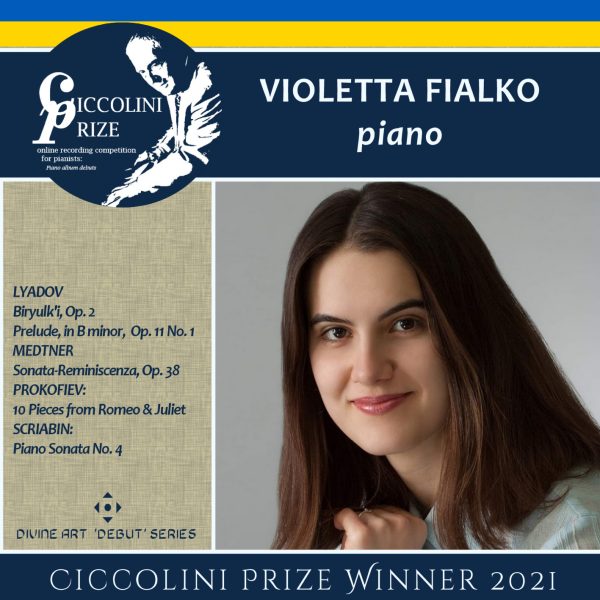Atlanta Audio Club
Violetta Fialko, born into a family of musicians, is a remarkably talented young Ukrainian pianist who shows a decided penchant for looking inside a given work of music and not taking it for granted. Educated at the Lysenko Specialized Music School in Kiev and the Kiev Conservatory, she has continued to reside in a section of her country that has not yet been ravaged by Putin’s war of aggression. And she has not allowed the tragedy occasioned by that conflict to erode her love and admiration for the music of the great Russian masters, four of whom are represented here in very illuminating performances.
First up is the whimsically entitled Spillikins (Biryul’ki) by Anatol Liadov (1855-1914), a composer who has not yet received his due as an innovative voice in Russian music. The curious name refers to a game, also known as “jackstraws,” in which the players attempt to extract individual straws from a pile without moving any of the others. The premium on patience and dexterity required by said game may serve as a metaphor for the skill needed by the keyboard artist who attempts these fourteen pieces.
They begin with a Presto that seems like a tribute to the Russian National School (Borodin, perhaps?), followed by an energetic Allegro, and then a slow, gracious Allegretto in waltz time that reveals Liadov’s skill in crafting a perfectly formed miniature. No. 4, Allegro con fuoco, is aggressive and probing, as befits its description (“with fire”), while No. 5 is a majestic Vivace and No. 7 a Moderato in lively accents.
No. 8, a discretely formed Allegro moderato, is succeeded by No. 9, Allegretto tranquillo, that manages to incorporate traits of both descriptions. No. 10, an Allegro is followed by No. 11, a handsome Tempo di valse. No. 12 is a Prestissimo of athletic virtuosity. No. 13, Vivace, is quieter than we might have expected from fts title. No.14, a Presto in perpetual motion, concludes the set admirably. A Prelude in B minor from 3 Pieces, Op. 11, is noble and restrained, packing a lot of musical substance in a timing of just 2:59.
Nicolai Medtner’s Sonata reminiscenza (Sonata remembered), all in a single movement, is taken by Fialko with consummate skill that emphasizes its natural fluidity between sections. Both lugubrious and lively, this is a difficult work to analyze and perform, but Fialko manages to accomplish both while bringing out the work’s delicate lyrical beauty.
Fialko goes on to capture all the vivacity, sadness and sheer lyrical beauty in Sergei Prokofiev’s Ten Pieces from Romeo and Juliet. This performance captures it all, from the tricky-fingered whimsicality of “Folk Dance” and “The Street Awakens” to the final poignancy of “Romeo and Juliet before Parting,” with its distilled sadness and its richly conveyed light-and-shadow substrate of emotions, ending in the ominous rattling of dry, untuned keys near the very end, a foreshadowing of the final tragedy.
Amid all these elements, “Friar Lawrence” comes across as a peaceful, sunlight-dappled interlude before we plunge on to the catharsis. Most memorable of the Ten Pieces is No. 4, “Juliet as a Young Girl,” with its deft portrait of the heroine: playful skittish, slightly poignant, poised on the verge of a life that, as we are forewarned, will end all too soon. Fialko brings out all these facets, and more, in Prokofiev’s music in a breathless performance that is beautifully detailed without being fussy.
Lastly, we are given Alexander Scriabin’s Sonata No. 4 in F-sharp Major, Op. 30. Fialko’s performance encompasses all the bold color elements in a work written in a rarely-used but unusually rich key signature (six sharps). Conceived at a time when the composer had become increasingly disenchanted with tonality itself, this work trades heavily on mystical sonorities, eccentric key resolutions, and the evocation of light as streaming from the vastness of the universe. Fialko reconciles all of these diverse elements unflappably in the course of a very satisfying performance.
@divineartrecordingsgroup
A First Inversion Company
Registered Office:
176-178 Pontefract Road, Cudworth, Barnsley S72 8BE
+44 1226 596703
Fort Worth, TX 76110
+1.682.233.4978
We noticed you're visiting from Latvia. We've updated our prices to Euro for your shopping convenience. Use Pound sterling instead. Dismiss












